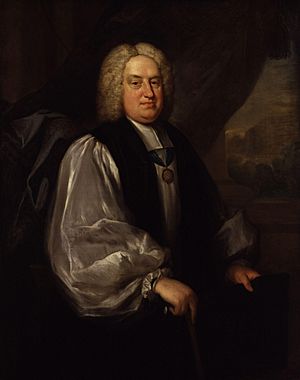Bangorian Controversy facts for kids
The Bangorian Controversy was a big argument about religion in the Church of England during the early 1700s. It also had strong political connections.
The argument started when a book by George Hickes was published in 1716, after he had died. Hickes was a bishop for a group called the non-jurors. This group had left the Church of England after the Glorious Revolution. In his book, Hickes said that everyone except the non-jurors was "excommunicated." This meant they were cut off from the church.
Benjamin Hoadly, who was the Bishop of Bangor, wrote a reply to Hickes's book. Hoadly believed that the king should have power over the church, not just religious leaders. He thought this was the only way to find the truth.
The controversy really exploded in 1717. Bishop Hoadly gave a sermon to King George I. The sermon was called The Nature of the Kingdom of Christ. Hoadly used a Bible verse that said, "My kingdom is not of this world." From this, he argued that the Bible does not support any kind of church government. He believed that the church was like the Kingdom of Heaven. Because it was not of this world, Christ had not given His power to any human leaders.
Contents
Two Ways of Thinking About Power
There were two main ideas about how government and power should work.
Power From God Down
One idea was that God chose the king and bishops to be leaders. They believed God gave these leaders special qualities. This view meant the king, as the head of the Established Church, was not just a leader of the country but also a religious leader. Power and rules flowed from God, down to the leaders, and then to the people. This was a common idea among the Tory party. It was also used to support the idea of the divine right of kings, which meant kings got their power directly from God.
Power From People Up
The other idea was that power came from the people and flowed up to the leaders. Those who led were not naturally better than the people they led. They also believed that God shares His wisdom freely with everyone. This was the view of the Whig party. It was also shared by groups like the Puritans, Congregational churches, Baptist churches, and Quakers.
King George I preferred the Whig party in Parliament. He also liked a more open and tolerant approach to church policies. He probably wanted to reduce the power of the wealthy noble families and the House of Lords. It was often hard for kings to control the bishops who were part of the House of Lords.
The Sermon and What Happened Next
Bishop Hoadly's sermon was published right away. People quickly started to criticize it. William Law and Thomas Sherlock strongly defended the traditional church structure.
Hoadly wrote another paper to answer some of his critics. These included Sherlock, Andrew Snape, and Francis Hare. The king then removed Snape, Hare, and another opponent, Robert Moss, from their roles as royal chaplains. However, Hoadly did not try to answer William Law. It is said that more than 200 pamphlets were published about this argument.
In May 1717, a church group called the Convocation formed a committee to look into Hoadly's sermon. When their report was ready to criticize Hoadly, the king stopped the Convocation from meeting. The Convocation did not meet again for over 130 years.
See also
- 1716 in literature
- 1717 in literature
- 1718 in literature
 | Kyle Baker |
 | Joseph Yoakum |
 | Laura Wheeler Waring |
 | Henry Ossawa Tanner |


